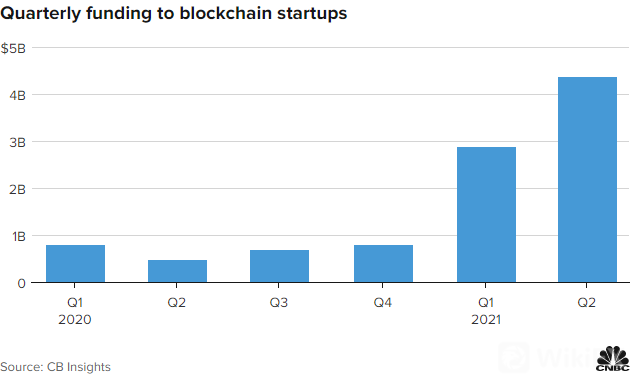Funding for blockchain start-ups topped $4 billion for the first time in the second quarter, despite a sharp slump in cryptocurrency prices.
Companies in the nascent industry raised a record $4.38 billion, according to data from analytics firm CB Insights, up more than 50% from the previous quarter and a nearly ninefold increase from the same period a year earlier.
Blockchain is the underlying technology behind most cryptocurrencies. Its essentially a digital ledger of virtual currency transactions which is distributed across a global network of computers.
The largest financing round for a blockchain company in the second quarter was a $440 million investment in Circle, a payments and digital currency firm. Circle recently announced plans to go public through a $4.5 billion merger with a blank-check company.
Ledger, which develops hardware wallets for people to store their digital currencies, attracted the second-biggest round in the quarter, raising $380 million. In a December interview, Ledger CEO Pascal Gauthier told CNBC the crypto market was maturing, with major institutional players getting involved.

“In 2018, when we raised our last round, financial institutions were not in the game,” he said, adding that now, “every major financial institution in the world either has a plan or is working on a plan” to invest in crypto.
The record funding highlights how investors are finding alternative ways to gain exposure to the crypto industry, by acquiring stakes in private start-ups developing technology for digital currencies and the distributed networks that underpin them.
Venture investors appear unfazed by declining cryptocurrency prices. Bitcoin has more than halved in value since hitting an all-time high of nearly $65,000 in April, when U.S. crypto exchange Coinbase went public.
Ether, the worlds second-biggest digital coin, has also fallen over 50% since notching a record high of more than $4,000 in May.
“At the current rate, blockchain funding will shatter the previous year-end record — more than tripling the total raised back in 2018,” Chris Bendtsen, senior analyst at CB Insights, told CNBC.
“Blockchain‘s record funding year is being driven by the rising consumer and institutional demand for cryptocurrencies,” he added. “Despite short-term price volatility, VC firms are still bullish on crypto’s future as a mainstream asset class and blockchains potential to make financial markets more efficient, accessible, and secure.”
Last month, Andreessen Horowitz launched a $2.2 billion cryptocurrency-focused fund. “We believe that the next wave of computing innovation will be driven by crypto,” the Silicon Valley venture capital firm wrote in a blog post.
Fintech funding frenzy
Funding for fintech companies as a whole also hit a new record. According to CB Insights, fintech start-ups raised an eye-watering $30.8 billion in the second quarter, up 30% from the previous quarter and almost triple the amount raised by fintechs in the second quarter of 2020.
Europe‘s fintech sector gained significant traction, with 50% of the top venture deals in the quarter going to European firms. The trend was boosted by growing interest from foreign investors in the continent’s fast-growing tech industry.
German stock-trading app Trade Republic raised the biggest round in Europe, bagging $900 million from the likes of Sequoia Capital and Peter Thiels Founders Fund. Mollie, a Dutch rival to payments firms Square, Stripe and Adyen, netted $800 million.
Private fintech valuations have also been climbing substantially, with Swedish buy-now-pay-later firm Klarna securing an almost $46 billion market value in June.
This has led to fears of a potential bubble in fintech. Iana Dimitrova, CEO of U.K. fintech start-up OpenPayd, told CNBC the uptrend in private financing rounds was “detrimental to the long-term sustainability of our industry.” The average size of fintech deals grew 28% in the second quarter, according to CB Insights.
Is fintech in a bubble?
Another fintech boss, Stefano Vaccino of London-based Yapily, disagrees. “I wouldn‘t see it as a bubble,” he said. “We have seen in the last 12 to 18 months an acceleration in financial services.” Andreas Weiskam, a partner at Yapily investor Sapphire Ventures, said it’s “a reflection of the great opportunity” in digital finance.
Yapily, which raised $51 million in fresh funding this week, is one of many companies developing technology to advance a new movement in finance called open banking, which aims to open up banks data and payment initiation to fintechs and other third parties.
Open banking has been gaining a lot of momentum lately, with Visa recently agreeing to acquire Tink, a Swedish open banking start-up, for $2.1 billion after failing to acquire Plaid, a similar firm in the U.S., due to regulatory pressure. Plaid went on to raise $425 million at a $13.4
billion valuation in an April funding round, while British rival TrueLayer raised $70 million.
Meanwhile, a growing number of fintechs have been tapping the public markets for the first time, with 19 firms going public or announcing IPO plans in the second quarter.
British money transfer Wise went public in London at an $11 billion valuation earlier this month, while a number of firms including Better.com, Dave, and Acorns announced plans to go public via mergers with special purpose acquisition companies, or SPACs.
In the crypto world, virtual currency exchange Coinbase went public in a blockbuster Nasdaq debut in April.
Leave a Reply